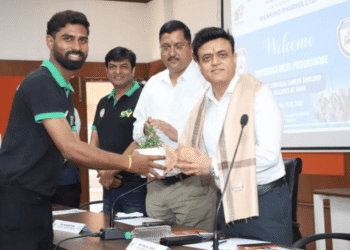With robotic-assisted surgery redefining women’s health, leading experts Dr. Rooma Sinha, Dr. Swapna Misra & Dr. Uddhavraj Dudhedia urge early adoption to tackle gynaecological disorders
Gynaecological disorders are on the rise in India, with conditions such as fibroids, ovarian cysts, endometriosis, and gynaecological cancers becoming increasingly prevalent. Healthcare experts stress the need for advanced surgical solutions, such as robotic-assisted surgery, to ensure better patient outcomes with reduced recovery times and minimal discomfort.
The Silent Crisis: The Growing Burden of Gynaecological Disorders in India
Women’s health has long been an overlooked area in mainstream healthcare discussions, but the alarming rise in gynaecological disorders has made it an urgent priority. Conditions such as fibroids, endometriosis, benign tumors, and ovarian and endometrial cancers are increasingly being diagnosed, affecting women’s quality of life. However, due to social stigma and fear of traditional surgical complications, many hesitate to seek timely intervention.
According to Dr. Rooma Sinha, Founder & President of Gynaecological Robotic Surgeons and Chief of Gynaecology at Apollo Hospital Jubilee Hills, Hyderabad, precision medicine is the key to changing this reality.
“Women already suffer from late menopause, irregular cycles, high-dose hormone therapies for infertility, metabolic disorders, and now ovarian and endometrial tumors. If they also have to endure the trauma of traditional surgery, it is unfair. But with robotic-assisted surgery, we can ensure minimal scarring, reduced pain, and faster recovery. With the da Vinci surgical system, patients are often discharged within 24 hours, and some even within 8-10 hours post-surgery.”
Robotic-Assisted Surgery: A Paradigm Shift in Women’s Healthcare
Minimally invasive surgery, powered by robotics and artificial intelligence, has drastically transformed surgical outcomes. With precision, enhanced visualization, and improved dexterity, robotic-assisted techniques have revolutionized oncology, particularly in women’s cancers.
Dr. Swapna Misra, a certified International Robotic Gynaecological Surgeon at Fortis Hospital Mohali, highlights the urgent need for awareness:
“The rising burden of endometrial and ovarian cancer is a pressing health crisis. The modern lifestyle, marked by chronic stress, obesity, and hormonal imbalances, is now affecting younger women, with diagnoses occurring as early as 25-35 years. Early screenings, combined with advanced robotic surgery, can significantly improve survival rates.”
Overcoming Fear & Misinformation: Need for Better Awareness
Despite medical advancements, lack of awareness and misconceptions about new technologies remain major barriers to care.
Dr. Uddhavraj Dudhedia, Gynaecological Robotic Oncosurgeon at Nanavati Max Super Speciality Hospital, Mumbai, stresses the need to bridge this gap:
“Many women hesitate to seek treatment due to fear of traditional surgery disrupting their lives. The absence of awareness about robotic-assisted surgery leads to delayed decision-making and prolonged suffering. From a comparative standpoint, I have observed that minimally invasive procedures using advanced technologies like da Vinci robotics reduce pain by 30-40% compared to conventional surgery. This not only enhances patient comfort but also improves overall recovery rates.”Beyond Oncology: The Future of Women’s Health & Robotics
The application of robotics in gynaecology is not limited to oncology. It is increasingly being used in cases such as hysterectomies, myomectomies (removal of fibroids), and complex pelvic reconstructive surgeries.
Dr. Devika Gunasheela, Founder of Tattvagene & Gunasheela Hospital, emphasizes how genetic testing and AI-driven reproductive healthcare are transforming fertility treatments:
“Infertility is not just a medical condition but an emotional and societal challenge. Many women face stigma when they struggle with conception. Genetic screening and AI-driven fertility treatments are transforming reproductive healthcare, improving pregnancy outcomes.”
Similarly, Dr. Sulochana Gunasheela, who pioneered IVF treatments in India, notes:
“Decades ago, when we introduced IVF, people were skeptical. Today, we integrate genetic testing and AI-based embryo selection to improve success rates and reduce emotional stress for aspiring mothers.”
The Intersection of Women’s Health & Workplace Policies
Beyond clinical advancements, women’s health must be integrated into corporate policies to ensure well-being across different life stages. Dr. Kavita Bhardwaj, Head of Exploration at Hindustan Zinc, believes:
“Women’s healthcare goes beyond maternal care. Workplace policies must address menstrual health, fertility treatments, and menopause to ensure that women do not have to choose between their careers and their health.”
Healthcare Accessibility for Working Women & Entrepreneurs
Maternity care and preventive screenings remain critical gaps for women entrepreneurs and working professionals. Madhura DasGupta Sinha, Founder & CEO of Aspire for Her, emphasizes:
“80% of women entrepreneurs struggle with healthcare access while managing businesses. We must build an ecosystem that supports working women with better insurance, maternity benefits, and preventive screenings.”
Similarly, Saibal Biswas, SVP at MediBuddy, highlights how digital healthcare can fill these gaps: “MediBuddy’s #HerHealthBuddy campaign tackles period stigma, reproductive health myths, and the gender gap in medical research. Women’s health must be prioritized year-round, not just on Women’s Day.”





























































































































































































































































































































































































